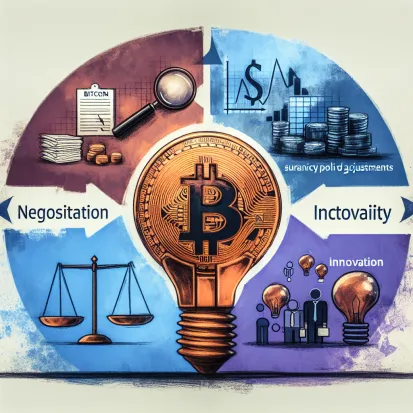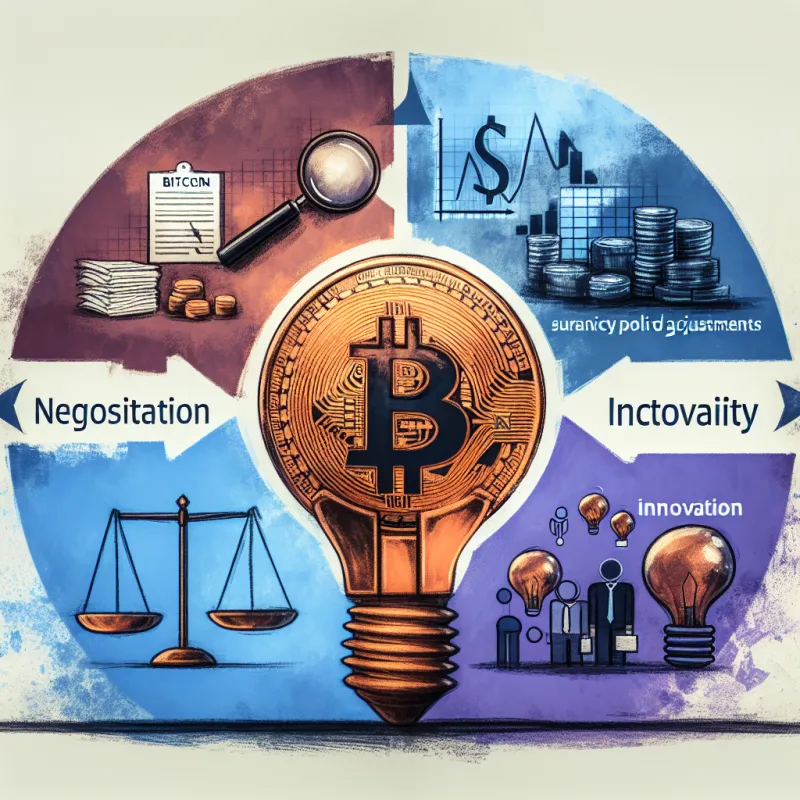El Salvador's Bitcoin Policy Adjustment: Navigating IMF Loan Conditions
Introduction
El Salvador made headlines with its decision to adopt Bitcoin as legal tender in 2021, a bold step that positioned the nation as a global pioneer in cryptocurrency adoption. Now, as they engage in negotiations with the International Monetary Fund (IMF) for critical financial assistance, the country faces increasing pressure to recalibrate its Bitcoin policies to meet specific loan conditions.
The IMF, while cautiously observing El Salvador's innovative approach, has raised concerns over financial stability, prompting the government to consider policy adjustments that align with traditional fiscal expectations. This article explores the nuances of these adjustments and their broader implications for the country's economy and its global standing.
The Need for Policy Adjustments
The Initial Bitcoin Mandate and Its Impact on Businesses
El Salvador’s Bitcoin mandate required businesses to accept the cryptocurrency as a form of payment. While this mandate catalyzed interest in Bitcoin, it also led to some operational challenges, especially for small businesses with limited resources to adapt to the new technology.
Reasons for Considering Voluntary Bitcoin Acceptance
To address the backlash from local businesses and regulatory bodies, the government is now exploring the idea of voluntary Bitcoin acceptance. This adjustment seeks to alleviate pressure on businesses while still promoting financial inclusivity and technological adoption.
IMF’s Concerns About Financial Stability
The IMF has voiced serious concerns regarding El Salvador's rapid embrace of Bitcoin, particularly its implications for financial stability and the lack of robust cryptocurrency regulations. The organization is insisting on stricter anti-money laundering measures and clearer policy guidelines, which may require significant adjustments in the country’s current strategy.
Financial Challenges and Government Obligations
El Salvador's Budget Deficit and Measures to Reduce It
The nation faces a sizable budget deficit, compelling the government to seek external financial assistance. Policymakers are implementing stringent measures to reduce this deficit, balancing their Bitcoin ambitions with conventional fiscal strategies.
Plans to Increase National Reserves and Combat Money Laundering
El Salvador aims to bolster its national reserves by incorporating both Bitcoin and USD, a move designed to hedge against potential risks. Additionally, stricter anti-money laundering measures are being implemented to address both domestic and international concerns raised by the IMF.
Anti-Corruption Measures as Part of IMF Loan Prerequisites
Securing the IMF loan requires El Salvador to adopt a more transparent governance structure. Anti-corruption measures are being intensified to instill confidence among global investors and international agencies. These measures, while rigorous, are seen as necessary steps to ensure long-term economic sustainability.
Public Perception and Economic Implications
Current Public Sentiment Towards Bitcoin vs. US Dollar
The public remains divided on the use of Bitcoin as legal currency. While tech-savvy citizens and younger generations embrace the change, many others prefer the stability of the US dollar. This divide underscores the challenges of implementing disruptive technologies on a nationwide scale.
President Nayib Bukele's Support for Bitcoin
President Nayib Bukele has been a strong advocate for Bitcoin, arguing that it offers opportunities for financial growth and inclusion. However, critics argue that such heavy reliance on Bitcoin may strain national reserves, especially during periods of volatility.
Positive Shifts in Sovereign Bond Trading
Despite concerns, El Salvador’s sovereign bonds have seen improvement in trading, reflecting growing investor confidence. The country's efforts to meet IMF expectations seem to be bearing fruit, with a notable uptick in credit ratings.
Global Perspectives and Future Outlook
The Potential Impact on El Salvador's Global Market Reputation
As one of the first nations to embrace Bitcoin, El Salvador has drawn significant international attention. Policy adjustments that address IMF conditions while maintaining a commitment to innovation can enhance the country's reputation as both a financial pioneer and a responsible economic steward.
How Policy Changes Could Influence Bitcoin’s Success in El Salvador
By navigating the fine line between innovation and regulation, El Salvador has the potential to set a precedent for other nations. Balancing Bitcoin adoption with fiscal discipline could create a sustainable model for integrating cryptocurrency into traditional economies.
The Ongoing Balancing Act Between Innovation and Fiscal Responsibility
El Salvador's case highlights the complexities of pioneering economic innovation in a global system that values predictability. Striking this balance will be crucial for the country's long-term economic stability and growth.
Conclusion
El Salvador's journey with Bitcoin represents both a bold economic experiment and a calculated risk. As the government adjusts its policies to secure an IMF loan, the nation may serve as a valuable case study for the intersection of cryptocurrency, governance, and global finance.
While uncertainty persists, the steps taken to reconcile innovation with fiscal responsibility could define new pathways for nations navigating similar economic crossroads. The coming months will reveal whether El Salvador can achieve a harmonious balance that ensures both financial stability and technological progress.


